- Release Notes and Announcements
- Release Notes
- Announcements
- qGPU Service Adjustment
- Version Upgrade of Master Add-On of TKE Managed Cluster
- Upgrading tke-monitor-agent
- Discontinuing TKE API 2.0
- Instructions on Cluster Resource Quota Adjustment
- Discontinuing Kubernetes v1.14 and Earlier Versions
- Deactivation of Scaling Group Feature
- Notice on TPS Discontinuation on May 16, 2022 at 10:00 (UTC +8)
- Basic Monitoring Architecture Upgrade
- Starting Charging on Managed Clusters
- Instructions on Stopping Delivering the Kubeconfig File to Nodes
- Security Vulnerability Fix Description
- Release Notes
- Product Introduction
- Purchase Guide
- Quick Start
- TKE General Cluster Guide
- TKE General Cluster Overview
- Purchase a TKE General Cluster
- High-risk Operations of Container Service
- Deploying Containerized Applications in the Cloud
- Kubernetes API Operation Guide
- Open Source Components
- Permission Management
- Cluster Management
- Cluster Overview
- Cluster Hosting Modes Introduction
- Cluster Lifecycle
- Creating a Cluster
- Deleting a Cluster
- Cluster Scaling
- Changing the Cluster Operating System
- Connecting to a Cluster
- Upgrading a Cluster
- Enabling IPVS for a Cluster
- Enabling GPU Scheduling for a Cluster
- Custom Kubernetes Component Launch Parameters
- Using KMS for Kubernetes Data Source Encryption
- Images
- Worker node introduction
- Normal Node Management
- Native Node Management
- Overview
- Purchasing Native Nodes
- Lifecycle of a Native Node
- Native Node Parameters
- Creating Native Nodes
- Deleting Native Nodes
- Self-Heal Rules
- Declarative Operation Practice
- Native Node Scaling
- In-place Pod Configuration Adjustment
- Enabling SSH Key Login for a Native Node
- Management Parameters
- Enabling Public Network Access for a Native Node
- Supernode management
- Registered Node Management
- GPU Share
- Kubernetes Object Management
- Overview
- Namespace
- Workload
- Deployment Management
- StatefulSet Management
- DaemonSet Management
- Job Management
- CronJob Management
- Setting the Resource Limit of Workload
- Setting the Scheduling Rule for a Workload
- Setting the Health Check for a Workload
- Setting the Run Command and Parameter for a Workload
- Using a Container Image in a TCR Enterprise Instance to Create a Workload
- Auto Scaling
- Configuration
- Register node management
- Service Management
- Ingress Management
- Storage Management
- Application and Add-On Feature Management Description
- Add-On Management
- Add-on Overview
- Add-On Lifecycle Management
- CBS-CSI Description
- UserGroupAccessControl
- COS-CSI
- CFS-CSI
- P2P
- OOMGuard
- TCR Introduction
- TCR Hosts Updater
- DNSAutoscaler
- NodeProblemDetectorPlus Add-on
- NodeLocalDNSCache
- Network Policy
- DynamicScheduler
- DeScheduler
- Nginx-ingress
- HPC
- Description of tke-monitor-agent
- GPU-Manager Add-on
- CFSTURBO-CSI
- tke-log-agent
- Helm Application
- Application Market
- Network Management
- Container Network Overview
- GlobalRouter Mode
- VPC-CNI Mode
- VPC-CNI Mode
- Multiple Pods with Shared ENI Mode
- Pods with Exclusive ENI Mode
- Static IP Address Mode Instructions
- Non-static IP Address Mode Instructions
- Interconnection Between VPC-CNI and Other Cloud Resources/IDC Resources
- Security Group of VPC-CNI Mode
- Instructions on Binding an EIP to a Pod
- VPC-CNI Component Description
- Limits on the Number of Pods in VPC-CNI Mode
- Cilium-Overlay Mode
- OPS Center
- Log Management
- Backup Center
- Cloud Native Monitoring
- Remote Terminals
- TKE Serverless Cluster Guide
- TKE Edge Cluster Guide
- TKE Registered Cluster Guide
- TKE Container Instance Guide
- Cloud Native Service Guide
- Best Practices
- Cluster
- Cluster Migration
- Serverless Cluster
- Edge Cluster
- Security
- Service Deployment
- Hybrid Cloud
- Network
- DNS
- Using Network Policy for Network Access Control
- Deploying NGINX Ingress on TKE
- Nginx Ingress High-Concurrency Practices
- Nginx Ingress Best Practices
- Limiting the bandwidth on pods in TKE
- Directly connecting TKE to the CLB of pods based on the ENI
- Use CLB-Pod Direct Connection on TKE
- Obtaining the Real Client Source IP in TKE
- Using Traefik Ingress in TKE
- Release
- Logs
- Monitoring
- OPS
- Removing and Re-adding Nodes from and to Cluster
- Using Ansible to Batch Operate TKE Nodes
- Using Cluster Audit for Troubleshooting
- Renewing a TKE Ingress Certificate
- Using cert-manager to Issue Free Certificates
- Using cert-manager to Issue Free Certificate for DNSPod Domain Name
- Using the TKE NPDPlus Plug-In to Enhance the Self-Healing Capability of Nodes
- Using kubecm to Manage Multiple Clusters kubeconfig
- Quick Troubleshooting Using TKE Audit and Event Services
- Customizing RBAC Authorization in TKE
- Clearing De-registered Tencent Cloud Account Resources
- Terraform
- DevOps
- Auto Scaling
- Cluster Auto Scaling Practices
- Using tke-autoscaling-placeholder to Implement Auto Scaling in Seconds
- Installing metrics-server on TKE
- Using Custom Metrics for Auto Scaling in TKE
- Utilizing HPA to Auto Scale Businesses on TKE
- Using VPA to Realize Pod Scaling up and Scaling down in TKE
- Adjusting HPA Scaling Sensitivity Based on Different Business Scenarios
- Storage
- Containerization
- Microservice
- Cost Management
- Fault Handling
- Disk Full
- High Workload
- Memory Fragmentation
- Cluster DNS Troubleshooting
- Cluster kube-proxy Troubleshooting
- Cluster API Server Inaccessibility Troubleshooting
- Service and Ingress Inaccessibility Troubleshooting
- Troubleshooting for Pod Network Inaccessibility
- Pod Status Exception and Handling
- Authorizing Tencent Cloud OPS Team for Troubleshooting
- Engel Ingres appears in Connechtin Reverside
- CLB Loopback
- CLB Ingress Creation Error
- API Documentation
- History
- Introduction
- API Category
- Making API Requests
- Cluster APIs
- DescribeEncryptionStatus
- DisableEncryptionProtection
- EnableEncryptionProtection
- AcquireClusterAdminRole
- CreateClusterEndpoint
- CreateClusterEndpointVip
- DeleteCluster
- DeleteClusterEndpoint
- DeleteClusterEndpointVip
- DescribeAvailableClusterVersion
- DescribeClusterAuthenticationOptions
- DescribeClusterCommonNames
- DescribeClusterEndpointStatus
- DescribeClusterEndpointVipStatus
- DescribeClusterEndpoints
- DescribeClusterKubeconfig
- DescribeClusterLevelAttribute
- DescribeClusterLevelChangeRecords
- DescribeClusterSecurity
- DescribeClusterStatus
- DescribeClusters
- DescribeEdgeAvailableExtraArgs
- DescribeEdgeClusterExtraArgs
- DescribeResourceUsage
- DisableClusterDeletionProtection
- EnableClusterDeletionProtection
- GetClusterLevelPrice
- GetUpgradeInstanceProgress
- ModifyClusterAttribute
- ModifyClusterAuthenticationOptions
- ModifyClusterEndpointSP
- UpgradeClusterInstances
- CreateCluster
- UpdateClusterVersion
- UpdateClusterKubeconfig
- DescribeBackupStorageLocations
- DeleteBackupStorageLocation
- CreateBackupStorageLocation
- Add-on APIs
- Network APIs
- Node APIs
- Node Pool APIs
- TKE Edge Cluster APIs
- DescribeTKEEdgeScript
- DescribeTKEEdgeExternalKubeconfig
- DescribeTKEEdgeClusters
- DescribeTKEEdgeClusterStatus
- DescribeTKEEdgeClusterCredential
- DescribeEdgeClusterInstances
- DescribeEdgeCVMInstances
- DescribeECMInstances
- DescribeAvailableTKEEdgeVersion
- DeleteTKEEdgeCluster
- DeleteEdgeClusterInstances
- DeleteEdgeCVMInstances
- DeleteECMInstances
- CreateTKEEdgeCluster
- CreateECMInstances
- CheckEdgeClusterCIDR
- ForwardTKEEdgeApplicationRequestV3
- UninstallEdgeLogAgent
- InstallEdgeLogAgent
- DescribeEdgeLogSwitches
- CreateEdgeLogConfig
- CreateEdgeCVMInstances
- UpdateEdgeClusterVersion
- DescribeEdgeClusterUpgradeInfo
- Cloud Native Monitoring APIs
- Virtual node APIs
- Other APIs
- Scaling group APIs
- Data Types
- Error Codes
- API Mapping Guide
- TKE Insight
- TKE Scheduling
- FAQs
- Service Agreement
- Contact Us
- Purchase Channels
- Glossary
- User Guide(Old)
- Release Notes and Announcements
- Release Notes
- Announcements
- qGPU Service Adjustment
- Version Upgrade of Master Add-On of TKE Managed Cluster
- Upgrading tke-monitor-agent
- Discontinuing TKE API 2.0
- Instructions on Cluster Resource Quota Adjustment
- Discontinuing Kubernetes v1.14 and Earlier Versions
- Deactivation of Scaling Group Feature
- Notice on TPS Discontinuation on May 16, 2022 at 10:00 (UTC +8)
- Basic Monitoring Architecture Upgrade
- Starting Charging on Managed Clusters
- Instructions on Stopping Delivering the Kubeconfig File to Nodes
- Security Vulnerability Fix Description
- Release Notes
- Product Introduction
- Purchase Guide
- Quick Start
- TKE General Cluster Guide
- TKE General Cluster Overview
- Purchase a TKE General Cluster
- High-risk Operations of Container Service
- Deploying Containerized Applications in the Cloud
- Kubernetes API Operation Guide
- Open Source Components
- Permission Management
- Cluster Management
- Cluster Overview
- Cluster Hosting Modes Introduction
- Cluster Lifecycle
- Creating a Cluster
- Deleting a Cluster
- Cluster Scaling
- Changing the Cluster Operating System
- Connecting to a Cluster
- Upgrading a Cluster
- Enabling IPVS for a Cluster
- Enabling GPU Scheduling for a Cluster
- Custom Kubernetes Component Launch Parameters
- Using KMS for Kubernetes Data Source Encryption
- Images
- Worker node introduction
- Normal Node Management
- Native Node Management
- Overview
- Purchasing Native Nodes
- Lifecycle of a Native Node
- Native Node Parameters
- Creating Native Nodes
- Deleting Native Nodes
- Self-Heal Rules
- Declarative Operation Practice
- Native Node Scaling
- In-place Pod Configuration Adjustment
- Enabling SSH Key Login for a Native Node
- Management Parameters
- Enabling Public Network Access for a Native Node
- Supernode management
- Registered Node Management
- GPU Share
- Kubernetes Object Management
- Overview
- Namespace
- Workload
- Deployment Management
- StatefulSet Management
- DaemonSet Management
- Job Management
- CronJob Management
- Setting the Resource Limit of Workload
- Setting the Scheduling Rule for a Workload
- Setting the Health Check for a Workload
- Setting the Run Command and Parameter for a Workload
- Using a Container Image in a TCR Enterprise Instance to Create a Workload
- Auto Scaling
- Configuration
- Register node management
- Service Management
- Ingress Management
- Storage Management
- Application and Add-On Feature Management Description
- Add-On Management
- Add-on Overview
- Add-On Lifecycle Management
- CBS-CSI Description
- UserGroupAccessControl
- COS-CSI
- CFS-CSI
- P2P
- OOMGuard
- TCR Introduction
- TCR Hosts Updater
- DNSAutoscaler
- NodeProblemDetectorPlus Add-on
- NodeLocalDNSCache
- Network Policy
- DynamicScheduler
- DeScheduler
- Nginx-ingress
- HPC
- Description of tke-monitor-agent
- GPU-Manager Add-on
- CFSTURBO-CSI
- tke-log-agent
- Helm Application
- Application Market
- Network Management
- Container Network Overview
- GlobalRouter Mode
- VPC-CNI Mode
- VPC-CNI Mode
- Multiple Pods with Shared ENI Mode
- Pods with Exclusive ENI Mode
- Static IP Address Mode Instructions
- Non-static IP Address Mode Instructions
- Interconnection Between VPC-CNI and Other Cloud Resources/IDC Resources
- Security Group of VPC-CNI Mode
- Instructions on Binding an EIP to a Pod
- VPC-CNI Component Description
- Limits on the Number of Pods in VPC-CNI Mode
- Cilium-Overlay Mode
- OPS Center
- Log Management
- Backup Center
- Cloud Native Monitoring
- Remote Terminals
- TKE Serverless Cluster Guide
- TKE Edge Cluster Guide
- TKE Registered Cluster Guide
- TKE Container Instance Guide
- Cloud Native Service Guide
- Best Practices
- Cluster
- Cluster Migration
- Serverless Cluster
- Edge Cluster
- Security
- Service Deployment
- Hybrid Cloud
- Network
- DNS
- Using Network Policy for Network Access Control
- Deploying NGINX Ingress on TKE
- Nginx Ingress High-Concurrency Practices
- Nginx Ingress Best Practices
- Limiting the bandwidth on pods in TKE
- Directly connecting TKE to the CLB of pods based on the ENI
- Use CLB-Pod Direct Connection on TKE
- Obtaining the Real Client Source IP in TKE
- Using Traefik Ingress in TKE
- Release
- Logs
- Monitoring
- OPS
- Removing and Re-adding Nodes from and to Cluster
- Using Ansible to Batch Operate TKE Nodes
- Using Cluster Audit for Troubleshooting
- Renewing a TKE Ingress Certificate
- Using cert-manager to Issue Free Certificates
- Using cert-manager to Issue Free Certificate for DNSPod Domain Name
- Using the TKE NPDPlus Plug-In to Enhance the Self-Healing Capability of Nodes
- Using kubecm to Manage Multiple Clusters kubeconfig
- Quick Troubleshooting Using TKE Audit and Event Services
- Customizing RBAC Authorization in TKE
- Clearing De-registered Tencent Cloud Account Resources
- Terraform
- DevOps
- Auto Scaling
- Cluster Auto Scaling Practices
- Using tke-autoscaling-placeholder to Implement Auto Scaling in Seconds
- Installing metrics-server on TKE
- Using Custom Metrics for Auto Scaling in TKE
- Utilizing HPA to Auto Scale Businesses on TKE
- Using VPA to Realize Pod Scaling up and Scaling down in TKE
- Adjusting HPA Scaling Sensitivity Based on Different Business Scenarios
- Storage
- Containerization
- Microservice
- Cost Management
- Fault Handling
- Disk Full
- High Workload
- Memory Fragmentation
- Cluster DNS Troubleshooting
- Cluster kube-proxy Troubleshooting
- Cluster API Server Inaccessibility Troubleshooting
- Service and Ingress Inaccessibility Troubleshooting
- Troubleshooting for Pod Network Inaccessibility
- Pod Status Exception and Handling
- Authorizing Tencent Cloud OPS Team for Troubleshooting
- Engel Ingres appears in Connechtin Reverside
- CLB Loopback
- CLB Ingress Creation Error
- API Documentation
- History
- Introduction
- API Category
- Making API Requests
- Cluster APIs
- DescribeEncryptionStatus
- DisableEncryptionProtection
- EnableEncryptionProtection
- AcquireClusterAdminRole
- CreateClusterEndpoint
- CreateClusterEndpointVip
- DeleteCluster
- DeleteClusterEndpoint
- DeleteClusterEndpointVip
- DescribeAvailableClusterVersion
- DescribeClusterAuthenticationOptions
- DescribeClusterCommonNames
- DescribeClusterEndpointStatus
- DescribeClusterEndpointVipStatus
- DescribeClusterEndpoints
- DescribeClusterKubeconfig
- DescribeClusterLevelAttribute
- DescribeClusterLevelChangeRecords
- DescribeClusterSecurity
- DescribeClusterStatus
- DescribeClusters
- DescribeEdgeAvailableExtraArgs
- DescribeEdgeClusterExtraArgs
- DescribeResourceUsage
- DisableClusterDeletionProtection
- EnableClusterDeletionProtection
- GetClusterLevelPrice
- GetUpgradeInstanceProgress
- ModifyClusterAttribute
- ModifyClusterAuthenticationOptions
- ModifyClusterEndpointSP
- UpgradeClusterInstances
- CreateCluster
- UpdateClusterVersion
- UpdateClusterKubeconfig
- DescribeBackupStorageLocations
- DeleteBackupStorageLocation
- CreateBackupStorageLocation
- Add-on APIs
- Network APIs
- Node APIs
- Node Pool APIs
- TKE Edge Cluster APIs
- DescribeTKEEdgeScript
- DescribeTKEEdgeExternalKubeconfig
- DescribeTKEEdgeClusters
- DescribeTKEEdgeClusterStatus
- DescribeTKEEdgeClusterCredential
- DescribeEdgeClusterInstances
- DescribeEdgeCVMInstances
- DescribeECMInstances
- DescribeAvailableTKEEdgeVersion
- DeleteTKEEdgeCluster
- DeleteEdgeClusterInstances
- DeleteEdgeCVMInstances
- DeleteECMInstances
- CreateTKEEdgeCluster
- CreateECMInstances
- CheckEdgeClusterCIDR
- ForwardTKEEdgeApplicationRequestV3
- UninstallEdgeLogAgent
- InstallEdgeLogAgent
- DescribeEdgeLogSwitches
- CreateEdgeLogConfig
- CreateEdgeCVMInstances
- UpdateEdgeClusterVersion
- DescribeEdgeClusterUpgradeInfo
- Cloud Native Monitoring APIs
- Virtual node APIs
- Other APIs
- Scaling group APIs
- Data Types
- Error Codes
- API Mapping Guide
- TKE Insight
- TKE Scheduling
- FAQs
- Service Agreement
- Contact Us
- Purchase Channels
- Glossary
- User Guide(Old)
NoteTPS was deactivated on May 16, 2022. For more information, see Notice on TPS Discontinuation on May 16, 2022 at 10:00 (UTC +8). The new Prometheus service will be provided by TMP.
If your Dynamic Scheduler uses TPS as the data source and you don't change it, the Dynamic Scheduler will become invalid. To use TMP as the data source, you need to upgrade the Dynamic Scheduler before associating it with a TMP instance, as TMP adds API authentication capabilities.
If your Dynamic Scheduler uses the self-built Prometheus service, it will not be affected by the TPS deactivation, but you need to guarantee the stability and reliability of the self-built Prometheus service.
Overview
Add-on description
The Dynamic Scheduler is a dynamic scheduler provided by TKE for pre-selection and preferential selection based on actual node loads. It is implemented based on the native kube-scheduler extender mechanism of Kubernetes. After being installed in a TKE cluster, this add-on will work with the kube-scheduler to effectively prevent node load imbalances caused by the native scheduler through the request and limit scheduling mechanisms.
This add-on relies on the Prometheus add-on and rule configuration. We recommend you follow the instructions in Deploying dependencies; otherwise, the add-on may not work properly.
Kubernetes objects deployed in a cluster
| Kubernetes Object Name | Type | Requested Resource | Namespace |
|---|---|---|---|
| node-annotator | Deployment | 100 MB CPU and 100 MiB MEM for each instance; one instance in total | kube-system |
| dynamic-scheduler | Deployment | 400 MB CPU and 200 MiB MEM for each instance; three instances in total | kube-system |
| dynamic-scheduler | Service | - | kube-system |
| node-annotator | ClusterRole | - | kube-system |
| node-annotator | ClusterRoleBinding | - | kube-system |
| node-annotator | ServiceAccount | - | kube-system |
| dynamic-scheduler-policy | ConfigMap | - | kube-system |
| restart-kube-scheduler | ConfigMap | - | kube-system |
| probe-prometheus | ConfigMap | - | kube-system |
Use Cases
Uneven cluster loads
Most of Kubernetes' native schedulers rely on Pod request resources for scheduling, which means that they cannot make decisions based on the actual node loads in the current and past periods of time and may cause the following problems:
A large number of remaining resources on some nodes of the cluster can be scheduled (value calculated based on the request and limit values of the running Pods on the nodes), but the actual loads are high; on other nodes, a small number of remaining resources can be scheduled, but the actual loads are low. In this case, the kube-scheduler will preferentially schedule Pods to nodes with more remaining resources (based on the LeastRequestedPriority policy).
The kube-scheduler will schedule the Pod to node 2, despite the fact that node 1 with a lower actual load level is a better choice.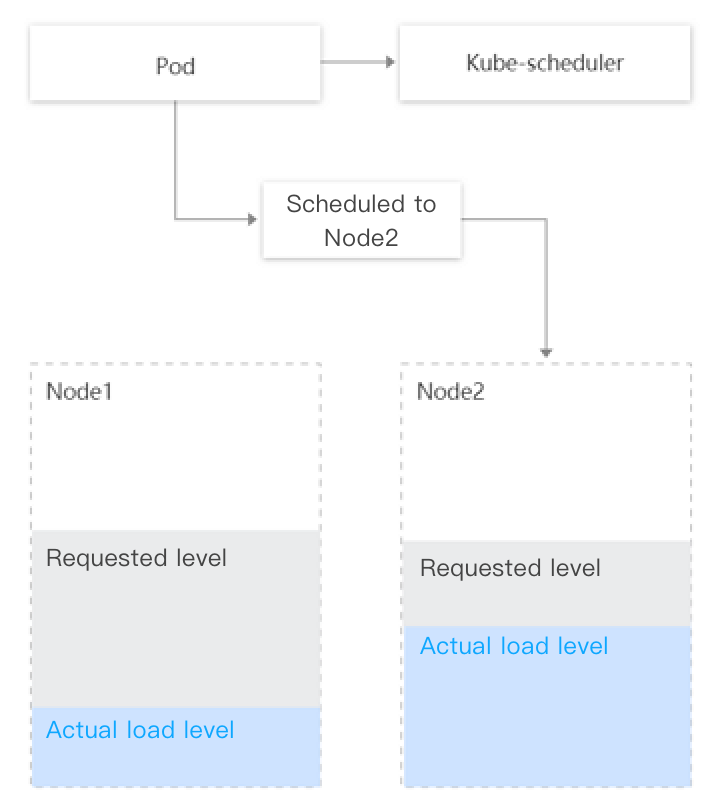
Avoiding scheduling hotspots
To avoid continuing to schedule Pods from low-load nodes, the Dynamic Scheduler supports a policy to avoid scheduling hotspots, that is, to collect the number of Pods scheduled in the past few minutes and lower the node's score during preferential selection.
The current policy is as follows:
- If more than two Pods are scheduled to the node in the past minute, the node's score for preferential selection is decreased by 1.
- If more than five Pods are scheduled to the node in the past five minutes, the node's score for preferential selection is decreased by 1.
Risk Control
- This add-on has been interconnected to TKE's monitoring and alarming system.
- We recommend you enable event persistence for the cluster to better monitor the add-on for exceptions and locate the problems.
- Uninstalling the add-on will only delete the scheduling logic of the Dynamic Scheduler and will not affect the scheduling feature of the native kube-scheduler.
Limits
- The TKE is on v1.10.x or later.
- If you need to upgrade the Kubernetes master version:
- For a managed cluster, you don't need to set the add-on again.
- For a self-deployed cluster, master version upgrade will reset the configurations of all the add-ons in the master, which affects the configuration of the Dynamic Scheduler add-on as a scheduler extender. Therefore, you need to uninstall the Dynamic Scheduler and install it again.
How It Works
The Dynamic Scheduler is based on the scheduler extender mechanism to get the node load from the Prometheus data. It adopts a scheduling policy based on the actual node load and performs intervention during pre-selection and preferential selection, so that Pods are preferentially scheduled to low-load nodes. This add-on consists of node-annotator and the dynamic scheduler.
node-annotator
node-annotator is responsible for regularly pulling the metrics of the node load from the monitoring data and sync them to the annotation of the node.
Note:After the add-on is deleted, the annotation generated by node-annotator will not be cleared automatically and needs to be cleared manually.
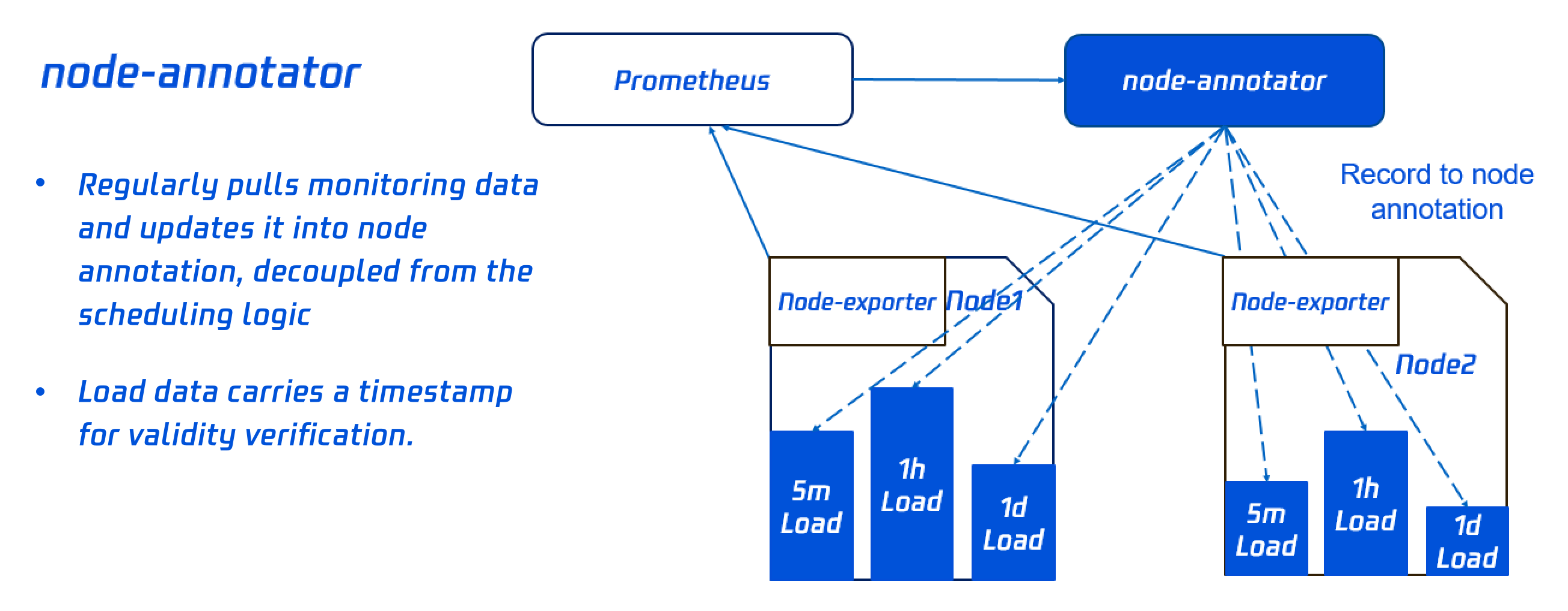
Dynamic scheduler
The dynamic scheduler is a scheduler extender that filters and scores the nodes during pre-selection and preferential selection based on the load data of the node annotation.
Pre-selection policy
To avoid scheduling Pods to high-load nodes, you need to filter out some high-load nodes during pre-selection. You can dynamically configure the filter policy and ratio as instructed in Add-On Parameter Description.
As both node 2's load in the past five minutes and node 3's load in the past hour exceed the threshold, they will not be included in preferential selection.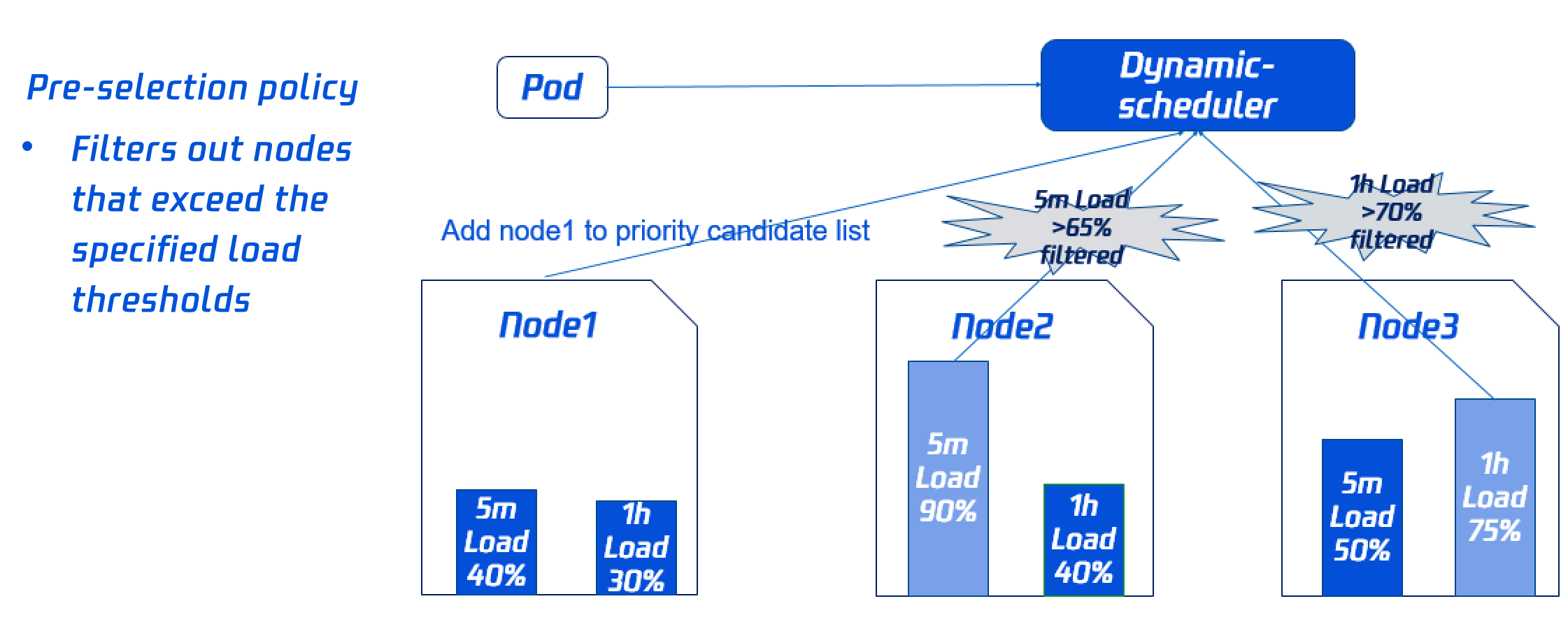
Preferential selection policy
To balance the loads on each node in the cluster, the dynamic scheduler will score the nodes based on their load data. The lower the load, the higher the score.
Node 1 with the highest score will be preferentially selected for scheduling. You can dynamically configure the scoring policy and weights as instructed in Add-On Parameter Description.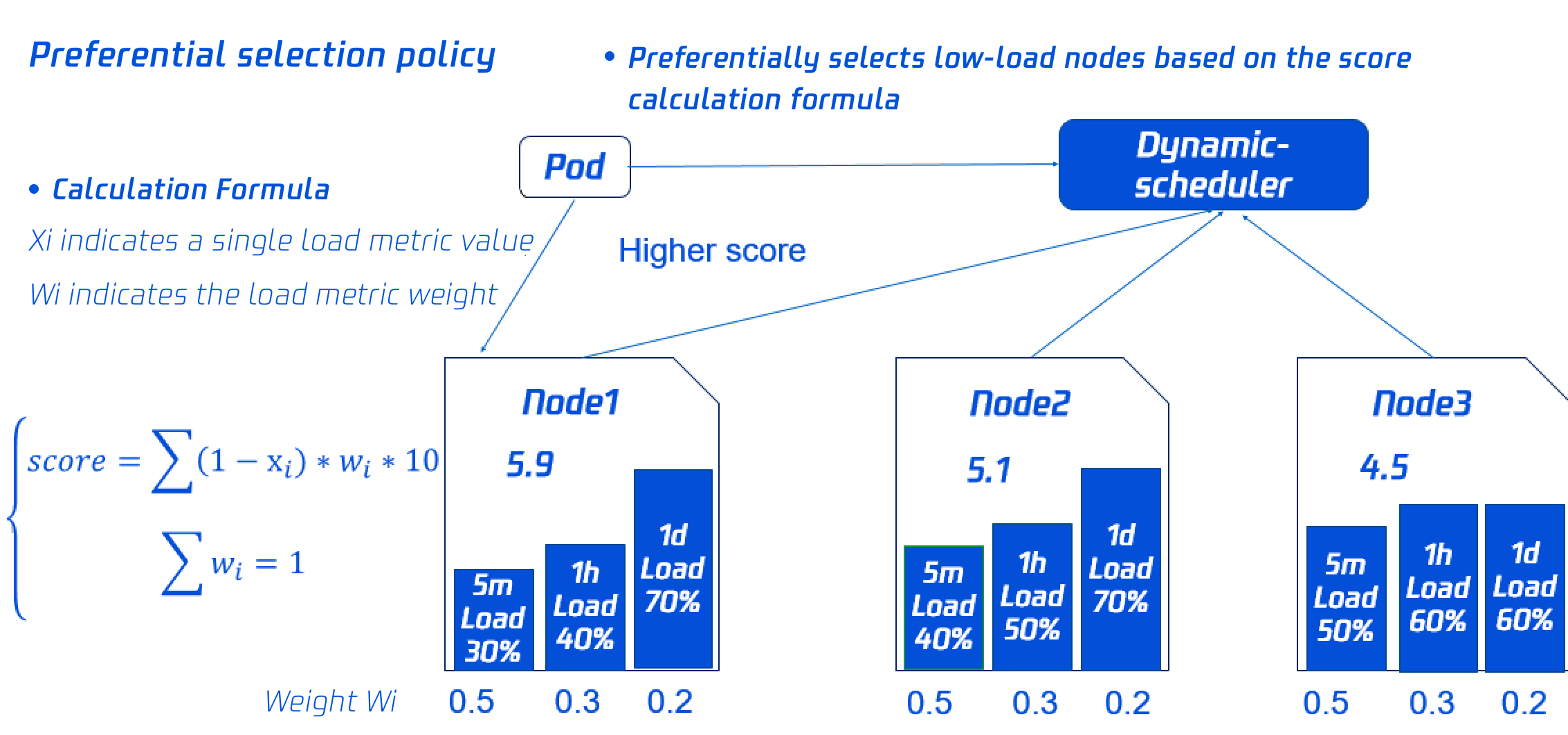
Add-On Parameter Description
Prometheus data query address
Note:
- To ensure that the required monitoring data can be pulled by the add-on and the scheduling policy can take effect, follow the Configuring the Prometheus rule step in Deploying dependencies to configure the monitoring data collection rules.
- Default values have been set for the pre-selection and preferential selection parameters. If you have no special requirements, you can directly use them.
- If you use the self-built Prometheus service, just enter the data query URL (HTTPS/HTTPS).
- If you use the managed Prometheus service, just select the managed instance ID, and the system will automatically parse the data query URL of the instance.
Pre-selection parameters
| Default Value of the Pre-selection Parameter | Description |
|---|---|
| Average CPU utilization threshold in five minutes | If the average CPU utilization of the node in the past five minutes exceeds the configured threshold, no Pods will be scheduled to the node. |
| Maximum CPU utilization threshold in an hour | If the maximum CPU utilization of the node in the past hour exceeds the configured threshold, no Pods will be scheduled to the node. |
| Average memory utilization threshold in five minutes | If the average memory utilization of the node in the past five minutes exceeds the configured threshold, no Pods will be scheduled to the node. |
| Maximum memory utilization threshold in an hour | If the maximum memory utilization of the node in the past hour exceeds the configured threshold, no Pods will be scheduled to the node. |
Preferential selection parameters
| Default Value of the Preferential Selection Parameter | Description |
|---|---|
| Average CPU utilization weight in five minutes | The greater the weight, the bigger impact the average CPU utilization in the past five minutes has on the node score. |
| Maximum CPU utilization weight in an hour | The greater the weight, the bigger impact the maximum CPU utilization in the past hour has on the node score. |
| Maximum CPU utilization weight in a day | The greater the weight, the bigger impact the maximum CPU utilization in the past day has on the node score. |
| Average memory utilization weight in five minutes | The greater the weight, the bigger impact the average memory utilization in the past five minutes has on the node score. |
| Maximum memory utilization weight in an hour | The greater the weight, the bigger impact the maximum memory utilization in the past hour has on the node score. |
| Maximum memory utilization weight in a day | The greater the weight, the bigger impact the maximum memory utilization in the past day has on the node score. |
Directions
Deploying dependencies
The Dynamic Scheduler relies on the actual node loads in the current and past periods of time to make scheduling decisions. It needs to get the information of the actual node loads of the system through the Prometheus add-on. Before using the Dynamic Scheduler, you need to deploy the Prometheus add-on. In the TKE, you can use the self-built Prometheus monitoring service or the cloud native monitoring service.
Deploying the Node Exporter and Prometheus
You can deploy the Node Exporter and Prometheus as needed to monitor node metrics through the Node Exporter.
Configuring aggregation rules
After getting the node monitoring data from the Node Exporter, you need to aggregate and calculate the data collected in the native Node Exporter through Prometheus. To get metrics such as cpu_usage_avg_5m, cpu_usage_max_avg_1h, cpu_usage_max_avg_1d, mem_usage_avg_5m, mem_usage_max _avg_1h, and mem_usage_max_avg_1d required by the Dynamic Scheduler, you need to configure rules in Prometheus as follows:
apiVersion: monitoring.coreos.com/v1
kind: PrometheusRule
metadata:
name: example-record
spec:
groups:
- name: cpu_mem_usage_active
interval: 30s
rules:
- record: cpu_usage_active
expr: 100 - (avg by (instance) (irate(node_cpu_seconds_total{mode="idle"}[30s])) * 100)
- record: mem_usage_active
expr: 100*(1-node_memory_MemAvailable_bytes/node_memory_MemTotal_bytes)
- name: cpu-usage-5m
interval: 5m
rules:
- record: cpu_usage_max_avg_1h
expr: max_over_time(cpu_usage_avg_5m[1h])
- record: cpu_usage_max_avg_1d
expr: max_over_time(cpu_usage_avg_5m[1d])
- name: cpu-usage-1m
interval: 1m
rules:
- record: cpu_usage_avg_5m
expr: avg_over_time(cpu_usage_active[5m])
- name: mem-usage-5m
interval: 5m
rules:
- record: mem_usage_max_avg_1h
expr: max_over_time(mem_usage_avg_5m[1h])
- record: mem_usage_max_avg_1d
expr: max_over_time(mem_usage_avg_5m[1d])
- name: mem-usage-1m
interval: 1m
rules:
- record: mem_usage_avg_5m
expr: avg_over_time(mem_usage_active[5m])
Configuring the Prometheus file
- The above section defines the
rulesto calculate the metrics required by the Dynamic Scheduler. You need to configure therulesto Prometheus as a general Prometheus configuration file. Below is a sample:global: evaluation_interval: 30s scrape_interval: 30s external_labels: rule_files: - /etc/prometheus/rules/*.yml # `/etc/prometheus/rules/*.yml` is the defined `rules` file. - Copy the
rulesconfigurations to a file (such asdynamic-scheduler.yaml) and put the file under/etc/prometheus/rules/of the above Prometheus container. - Load the Prometheus server to get the metrics required by the Dynamic Scheduler from Prometheus.
NoteIn general, the above Prometheus configuration file and
rulesconfiguration file are stored via a ConfigMap before being mounted to a Prometheus server's container. Therefore, you only need to modify the ConfigMap.
Installing the add-on
- Log in to the TKE console and select Cluster on the left sidebar.
- On the Cluster management page, click the ID of the target cluster to go to the cluster details page.
- On the left sidebar, click Add-On Management.
- On the Add-On List page, select Create. On the Create Add-on page, select DynamicScheduler (dynamic scheduler).
- Click Parameter Configurations and enter the parameters required by the add-on as instructed in Add-On Parameter Description.
- Click Done. After the add-on is installed successfully, the Dynamic Scheduler can run normally without extra configurations.
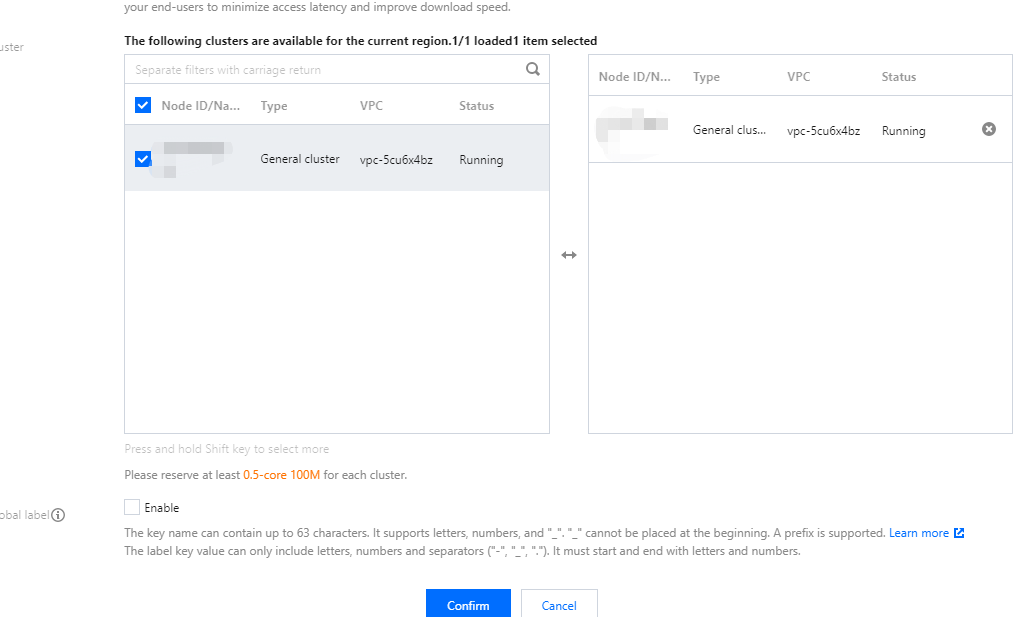
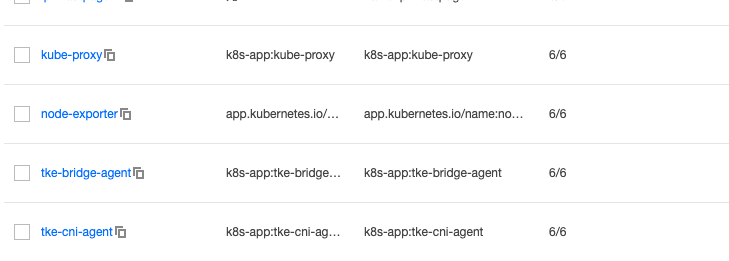

 Yes
Yes
 No
No
Was this page helpful?